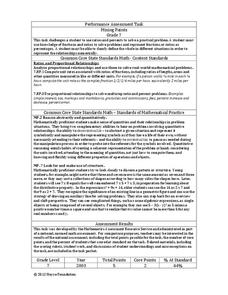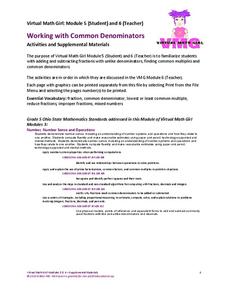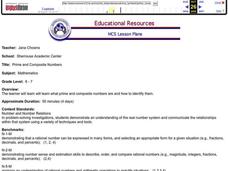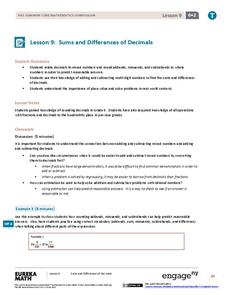Curated OER
Noncombatancy and the Seventh day Adventist Church
Upper graders investigate how the Seventh Day Adventists are objectors to the practice of war. The lesson covers the Civil War and examines the church's position about the practice of war. The research extends to modern wars and learners...
Noyce Foundation
Mixing Paints
Let's paint the town equal parts yellow and violet, or simply brown. Pupils calculate the amount of blue and red paint needed to make six quarts of brown paint. Individuals then explain how they determined the percentage of the brown...
California Education Partners
Window Washers
Aim high with a task on window washers. An assessment task challenges learners to determine the number of windows two people wash. They do this using a given number of window rows on each side of a building. In addition, they find the...
Buffalo State
A Five Day Approach to Using Technology and Manipulatives to Explore Area and Perimeter
Young mathematicians build an understanding of area and perimeter with their own two hands in a series of interactive geometry lessons. Through the use of different math manipulatives, children investigate the properties of rectangles,...
Inside Mathematics
Party
Thirty at the party won't cost any more than twenty-five. The assessment task provides a scenario for the cost of a party where the initial fee covers a given number of guests. The class determines the cost for specific numbers of guests...
California Education Partners
Photos
Why do all sizes of pictures not show the same thing? Class members analyze aspect ratios of various sizes of photos. They determine which sizes have equivalent ratios and figure out why some pictures need to be cropped to fit particular...
PBS
Working with Common Denominators: Activities and Supplemental Materials
Enjoy these straightforward and simple worksheet pages that practice with different denominators. The practice starts simple with adding fractions together and then works on a recipe that needs to be tripled.
Computer Science Unplugged
The Chocolate Factory–Human Interface Design
What is this? What is it for? How does it work? Challenge the class to think about to how to design a new chocolate factory for the Oompa-Loompas to make it easy to use. The activity is the first of a three-part series on computer-human...
Curated OER
Drinking Juice
Pictures, number lines, decimal equivalents, or Cuisenaire rods can be used to show insight into the meaning of multiplying fractions.Here, Alisa drinks 3/4 of 1/2 liter of juice. To find the total volume of the juice that Alisa drank,...
Curated OER
Prime and Composite Numbers
Prime and composite numbers are the focus of this mathematics lesson. In it, learners practice techniques for identifying these two types of numbers. They utilize the Inspiration program to complete a task that is clearly explained, and...
EngageNY
Sums and Differences of Decimals
Sometimes dealing with decimals is so much easier than dealing with fractions. The ninth lesson in a 21-part module has the class consider situations when it might be easier to add or subtract fractions by first converting to decimals....
California Education Partners
Miguel's Milkshakes
Moooove over, there's a better deal over there! The fourth segment in a series of eight requires individuals to determine the best unit cost for milk. Scholars calculate the least amount they can spend on a particular quantity of milk....
California Education Partners
Colorful Data
Scale up your lessons with a performance task. Young data analysts work through an assessment task on scaled bar graphs. They answer questions about a given scaled bar graph on favorite colors, analyze a bar graph to see if it matches...
California Education Partners
Fun on the Farm
Let imaginations run wild as participants design animal pens. A performance task challenges young mathematicians to determine the perimeter or a missing side length of different animal pens. They then design pens that meet given...
California Education Partners
Lashelles Garden
Let knowledge grow bountifully like plants in a garden. Given a diagram of a rectangular garden split into plots, scholars determine the area of the entire garden and the areas of the individual plots. As a culminating activity, they...
Inside Mathematics
Rugs
The class braids irrational numbers, Pythagoras, and perimeter together. The mini-assessment requires scholars to use irrational numbers and the Pythagorean Theorem to find perimeters of rugs. The rugs are rectangular, triangular,...
California Education Partners
Least and Greatest
Squares can be magic. Pupils use their knowledge of addition of positive and negative rational numbers to create a 3 X 3 magic square where the sums are 1. Scholars create addition and multiplication expressions with a set of rational...
Workforce Solutions
Egg-streme Sports
Here's a new twist in the egg drop competition. Using only six inches of tape, four straws, and 2 pieces of newspaper, teams build a structure that keeps an egg from breaking when dropped. What's different about this project is that the...
Inside Mathematics
Winning Spinners
Winning a spin game is random chance, right? Pupils create a table to determine the sample space of spinning two spinners. Individuals determine the probability of winning a game and then modify the spinners to increase the probability...
California Education Partners
Linflower Seeds
How does your garden grow? Use proportions to help Tim answer that question. By using their understanding of proportional relationships, pupils determine the number of seeds that will sprout. They create their own linear relationships...
California Education Partners
Tile Mural
Paste this resource into your lesson plans like you'd paste a tile onto a mural. Given a diagram of a tile mural with rectilinear figures, future artists determine the perimeters and areas of the figures. They must then develop their own...
Curated OER
Chances Are......You're Right
Young mathematicians study probability. In this math lesson, learners calculate odds, and convert those into percentages of probability. Fractions are also used, making this lesson quite rich in some of the more difficult conversions...
Utah Education Network (UEN)
Subtracting Integers
Review the concepts of additive inverses and adding positive and negative integers. Relate understanding to the subtraction of integers. This is done with either the use of "Algeblocks" (any square or tile manipulative should do) or a...
Montana Office of Public Instruction
Native American Culture: Counting, 1:1 Correspondence
Kindergarteners practice showing 1:1 correspondence while incorporating information they learned about a local Native American culture. The objects used for counting are taken from the previous day's Native American lesson. The intention...

























